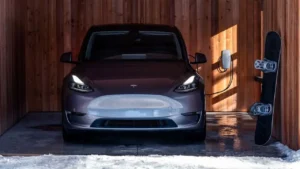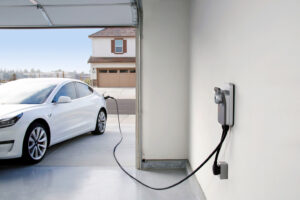When it comes to installing an electric vehicle (EV) charger at home, there’s one key decision you’ll need to make early on: hardwired or plug-in? Plug-in chargers seem appealing at first glance because they’re easy to install, flexible, and mobile. However, the long-term advantages of hardwired EV chargers make them the clear choice for serious EV owners.
So yes, the choice will be a hardwired charger 99% of the time. But since there is still nuance to this, let’s break down why hardwired is the clear winner.
Performance and Power Delivery
A hardwired EV charger connects directly to your home’s electrical system. There’s no outlet. No plug. Just a direct line that gives your charger a dedicated circuit, meaning fewer interruptions, no shared loads, and maximum power efficiency.
Plug-in models, on the other hand, rely on an outlet – typically a NEMA 14-50. That outlet may be shared with other appliances or subject to code restrictions. And while many plug-ins are rated for 40 amps, they often default to lower amperage charging to stay within safety margins. In contrast, hardwired chargers can safely run at higher amperages (like 48A or even 60A), offering faster charging times. So, if you’re tired of trickle charging and want your vehicle ready when you are, hardwired is the way to go.
Learn More About Different Types of Electric Car Chargers
Durability and Safety
Let’s talk wear and tear. Plug-in chargers are exposed to repeated movement with regular plugging in, unplugging, cable strain, and even potential outdoor exposure. Every one of those is a failure point.
Hardwired chargers are permanently mounted and sealed. No exposed plug to loosen over time. No weather-worn outlet. Fewer things to go wrong. Especially in climates like the Pacific Northwest, where moisture and temperature swings wreak havoc on connections, a hardwired setup offers better long-term reliability and fewer maintenance headaches.
Code Compliance
Here’s something most plug-in users overlook: the National Electrical Code (NEC) places limitations on continuous loads through receptacles. EV charging is considered a continuous load. That means most 50A receptacles (used for plug-in chargers) should only be loaded to 80% – 40 amps max. And if your charger isn’t hardwired, local jurisdictions may require additional safeguards, including outlet covers, GFCI protection, and dedicated space around the receptacle.
With a hardwired charger, you bypass all of that. It’s directly installed by a licensed electrician, sized correctly, and tailored to your home’s panel capacity. You’re not just “meeting code” – you’re exceeding it.
What to know when installing home EV charging stations
A Smarter Investment
A plug-in charger might save you a few hundred bucks upfront, especially if you already have a NEMA 14-50 outlet. But that saving disappears quickly if you need to replace the charger, repair a loose outlet, or pay to upgrade later.
A hardwired EV charger is a more permanent solution. It’s secure, high-performing, and built for long-term use. It also adds more value to your home, especially as EV ownership becomes more widespread.
If you’re charging an EV once a week and moving homes next year, a plug-in might be fine. But if you’re building a reliable, efficient charging setup for daily use, don’t settle. Go hardwired. It’s faster. It’s safer. It’s built to last.
Prairie Electric installs Level 2 EV chargers in Vancouver, Ridgefield, Portland metro area, Pasco and Tri-Cities area. Contact Prairie Electric for a site assessment and EV charger installation built to fit your needs.


